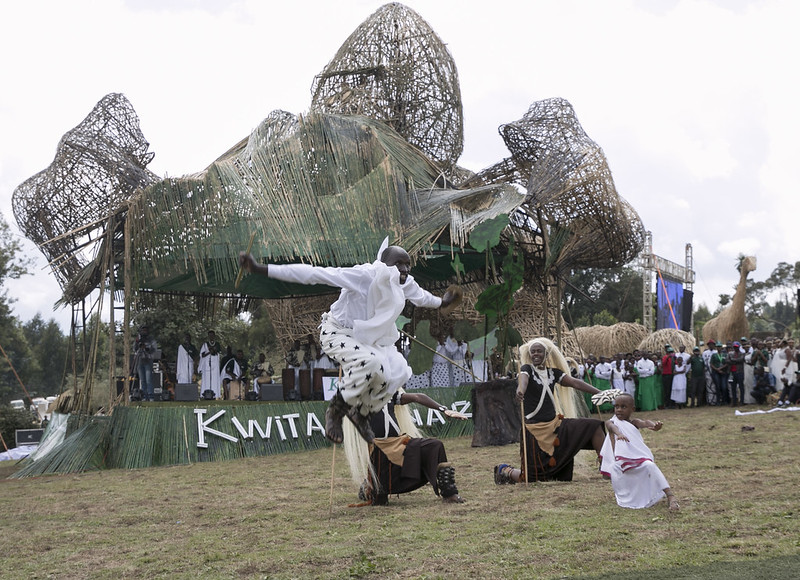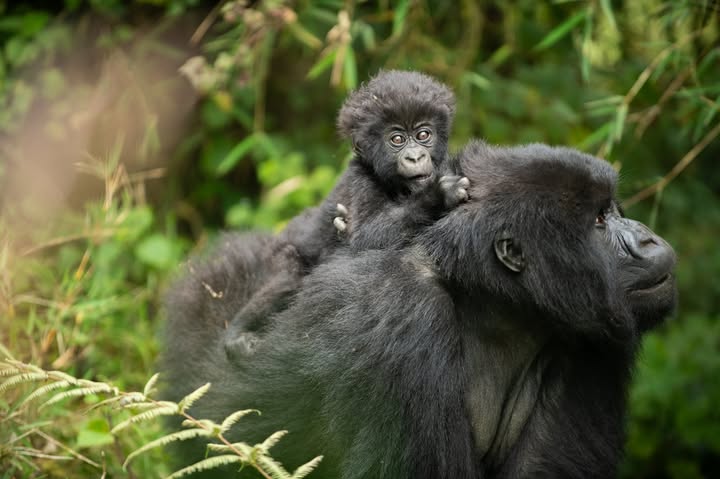Photo: Instagram | Visit Rwanda
In some African cultures, newborns get a special welcome party! The naming ceremony, usually held within a week after the baby is born, brings together family and friends for a celebration, where the newborn’s names are officially announced.
Think naming ceremonies are just for newborns? Think again! In Rwanda, gorillas get their naming ceremonies, just like humans. Kwita Izina, meaning “to give a name” in Kinyarwanda, has been part of Rwandan culture for centuries. Traditionally, Rwandan families would gather to name newborns in a ceremony full of joy and celebration. Today, this tradition is extended to Rwanda’s mountain gorilla population.
Kwita Izina, Rwanda’s iconic gorilla naming ceremony, is not only unique but also a way to raise awareness and funds for the protection of mountain gorillas and expanding their natural habitats. It’s a heartwarming way to celebrate new life while contributing to their conservation.
There are an estimated 1,063 mountain gorillas according to the latest census results (which come out every 5-10 years). These endangered creatures live in east-central Africa in just two isolated groups – one in the Virunga Volcanoes (a region spanning 3 national parks in Uganda, Rwanda, and Democratic Republic of Congo (DRC)) and one in Bwindi Impenetrable National Park, Uganda, which connects to Sarambwe Nature Reserve, DRC.
Kwita Izina is celebrated annually in September at the community grounds in Kinigi, Musanze District, right outside Volcanoes National Park, northwest of Rwanda’s capital, Kigali. During the event, baby mountain gorillas born in Volcanoes National Park the year before receive their names.
How the Names are Picked
Rwanda began officially naming mountain gorillas in 2005. Before then, it fell to the park rangers who protected them to name the gorillas. They were given names that wove meaning and connections to their past and places, aiding rangers and researchers in tracking individual progress within their family units and across habitats. Since the ceremony began in 2005, 397 baby gorillas have been named during the annual Kwita Izina festival. The names are not just picked, they are thoughtfully selected to reflect the infant’s individual story and heritage or to harness good luck and protection. By giving these majestic animals a name, we give them the value they undoubtedly deserve.
The naming ceremony occurs on a bamboo stage that resembles a majestic silverback gorilla and is one of the most significant moments of the event. During this event, carefully chosen names are given to the gorillas born in Rwanda’s Volcanoes National Park throughout the previous year. Participants meticulously select these names to reflect the unique behaviors and character traits of the baby gorillas. These names are not just labels to Rwandans, who believe they hold great significance and an extraordinary power capable of bringing blessings and shaping the future destinies of these baby gorillas.
The ceremony has grown into an internationally celebrated event that attracts conservationists, park rangers, researchers, and high-profile guests. In true Rwandan style, the event is vibrant and filled with traditional performances, local music, and dance. It also features other exciting activities, such as conferences and workshops.
The 20th Kwita Izina Gorilla Naming Ceremony will happen on Friday, 18th October 2024. As part of the celebration, baby gorillas born in the past 12 months will receive their names.

Kwita Izina in 2023. UWIMPUHWE Va, CC BY-SA 4.0, via Wikimedia Commons
Significance of The Kwita Izina Ceremony
Since its inception in 2005, Kwita Izina has been instrumental in promoting the conservation of mountain gorillas, embodying Rwanda’s unique stories, and cultural heritage and invoking blessings and protection. It is also a way of raising support and funds for the ongoing protection of the country’s mountain gorillas and the expansion of their habitat.
The ceremony serves as an opportunity to appreciate those involved – the communities that live around Volcanoes National Park, research partners, vets, and the dedicated conservationists, rangers, and trackers who protect the gorillas – for their conservation efforts and are encouraged to continue.
The event fills every Rwandan heart with immense pride, fostering a sense of shared responsibility among local communities, government bodies, and international organizations, while also highlighting the importance of involving everyone in conservation efforts. This in turn supports the livelihoods of the local community through eco-tourism and employment opportunities.
Kwita Izina is a powerful tool for raising global awareness about the plight of mountain gorillas and the need for their protection. The event brings together conservationists, policymakers, celebrities, and dignitaries from across the globe.
Let’s not forget the economic benefits. The ceremony which attracts people from all walks of life directly boosts eco-tourism. In 2019, for instance, Rwanda welcomed over 1.6 million visitors, among whom over 17,249 visited the majestic mountain gorillas in Volcanoes National Park. The park permits sold were worth US$ 18.7 million, a 25% increase compared to 2018. Revenue from tourism is reinvested into local communities, creating jobs and funding development projects.
Notable Guests and Their Contributions
The past editions of Kwita Izina have witnessed prominent figures making indelible contributions. In 2016, revered naturalist Sir David Attenborough graced the event, where he named a baby gorilla Inshungu, meaning blessing.
In 2017, Dr. Stoinski chose the name Macibiri, in tribute to Dian Fossey, whose Rwandan nickname was Nyiramacibiri, roughly translated as ‘the woman who lives alone on the mountain.’
The year 2018 saw Laureano Bisan Etamé-Mayer, a former Arsenal footballer, naming a baby gorilla Ikipe, meaning ‘team,’ alongside other evocative names like Izahabu (‘precious’), Kunesha (‘to win’), and Uburumbuke (‘prosperity’).
All were received with excitement, cheers, and a collective sense of hope for their future.





